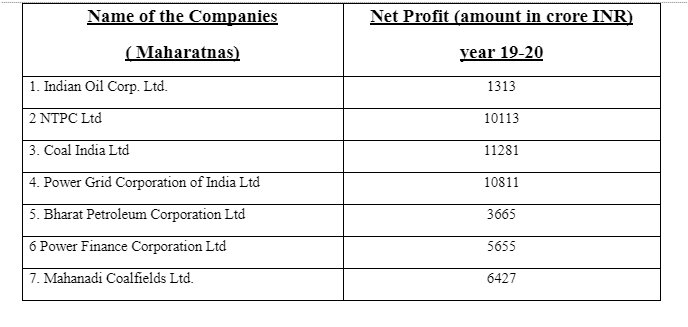Introduction
When the Central or State Governments, or a combination of the two, possess not less than 50 per cent of a business’s equity or capital, the company is known as a ‘Government Company. This government corporation is sometimes referred to as a ‘public enterprise’ or a state enterprise. The Companies Act requires them to be properly registered.
A Government Company is defined as a company in which any government partly owns a share of the company. Central Government and partly by one or more State Governments, holds not less than 50 percent of the paid-up share capital and includes a company which is a subsidiary company of such a Government Company.
List of Government Companies in India
The list of government companies in India is as follows:

Features of a Government Company
Certain features are anticipated in any type of organization. Similarly, certain traits exist in Government Corporations. Such qualities are discussed in the next paragraph.
The features of a Government Company are as follows:
- Section 2 of the Companies Act of 2013 establishes government companies (45). The Government Companies adhere to the restrictions specified in this section.
- Government agencies, like all other enterprises, have a unique legal entity that may be sued and sued in court. They may also own property in their own name.
- At the end of the fiscal year, the annual reports must be given to both houses of Parliament.
- The state and federal governments will possess the company’s capital jointly or individually, which will be wholly or partially held by the state and federal governments.
- Directorship is handled by the government, which appoints them.
- The government has appointed Chartered Accountants to offer to account and to look after the audit of government companies.
- Workers do not work for the government. In line with the articles of incorporation, they establish their own personal policy.
Limitations of a Government-Owned Enterprise
- These companies are susceptible to a tremendous lot of government influence and involvement from officials, ministers, and legislators.
- Because these firms are supported by the government, they are not required under the constitution to report to the legislature.
- Because the board of directors is largely made up of politicians and public officials who are more concerned with satisfying their political party comrades or owners than with the company’s growth and development, the company’s effective operations are hampered.
Suitability of a Government Company
- Private-sector firms are sometimes compelled to collaborate with public-sector enterprises to create strategic growth for society. When it comes to awarding all rights that a private sector business does not have, the eligibility of a government entity becomes increasingly crucial.
- Goals are not reached when private sector firms do not have a financial strategy in place. In this case, the private sector collaborates with government-owned enterprises to foster synergistic growth and expansion.
Government Companies in India
India is classed as a developing country with a diversified economic structure in terms of trade. This suggests that significant firms in India are owned by both private and public bodies. While the government is largely active in essential sectors like petroleum and mining, private companies also participate in development.
Understanding the Background of Government-Owned Businesses
On Earth, humans depend on resources to survive. A resource is any material obtained from nature that may be used by humans for food, shelter, or other services. As early as the Neolithic age, mankind started refining raw materials for its own purposes.
Industrial practices became more localized as the population expanded. In today’s world, we see businesses processing raw materials on a single site. People’s attempts to sell products and earn a profit started this. With the establishment of a government system, it acquired responsibility for a portion of the work involved in creating goods and services for the general public. It established companies to manage the industrial divisions systematically. Government companies are what they’re called.
Conclusion
A government company is a public business established according to the Indian Companies Act of 1956. These firms are owned and managed by the government, either at the federal or state level. Even though these companies are registered as private limited companies, the government maintains management and control. This is a corporate concept in which both the government and private individuals own shares. Firms with a mix of owners are frequently referred to as such.
 Profile
Profile Settings
Settings Refer your friends
Refer your friends Sign out
Sign out






